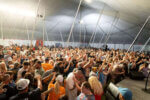In an age of doubt and skepticism, how do you deepen your faith in God? As life feels more chaotic, where do you find an inner stability grounded the unchangeable reality of a risen Savior and the eternal word of God? These are questions we all face.
In Ephesians 6, the apostle Paul tells us we should actively dress ourselves each day in spiritual armor. With the helmet of salvation, the breastplate of righteousness and the sword of the Spirit—this is how we are to meet life. But one phrase in particular stands out in Paul’s description. He says that, in every circumstance, we should “take up the shield of faith.” Let me suggest five simple and practical ways you can do this—and see your faith in God grow.
The First Available 10 Minutes
I’ve seen people go through their entire adult lives waiting for the perfect time to read the Bible. An organized Bible study may give specific homework that will get you into the Word, and that’s helpful. But the simple daily choice to read a couple paragraphs in Isaiah or Romans or Genesis—or whatever book you’re in—can be far more personal. It’s where you’ll get a sense of walking down the path of your life with God.
I often encourage women to develop a small discipline of taking the “first available 10 minutes” with God. Maybe you’re nursing a baby, caring for a disabled spouse or facing an overwhelming season at work. There is too much coming at you. Ten minutes may be all you’ve got. But if you’ll take the 10 minutes you have—rather than pining for the 30 minutes you wish you had—you may discover the word of grace you desperately need. God is always willing and waiting to meet with you. And I cannot count the times when I’ve been surprised by a word of encouragement or challenge that God has dropped on me because of my willingness to take the first available 10 minutes to open my soul—and open His book.
The Whole-Gospel Filter
When Connally Gilliam and I wrote And Yet Undaunted, we set out to explore the goodness of God as it unfolds in the richness of the four-act play of the gospel: creation, the fall, redemption and restoration. This is the larger story into which our lives are caught up, in all the best ways. When you put your trust in Jesus Christ, your small story becomes infused with meaning, which is the essence of a deepening faith.
This is what it looks like to pray about a particular difficulty through the lens of the whole gospel: Suppose you have a child who is addicted to drugs. You are worried about her future. You begin to pray by remembering that God created her for good purposes. God loves her even more than you do. Your daughter’s addiction is a particularly awful taste of the fall. But God has not left her—or you—alone in this struggle. You believe God can redeem even this place in your daughter’s life. And you look forward to the day when all things have been restored, when sin and temptation, illness and addiction will be no more.
When I pray about a hard place in my life through the filter of the gospel—what ought to be, what is, what can be, and what will be—I find that the situation starts to look different. I’m not alone, and the problem is not as overwhelming. I’m comforted by knowing that whatever I’m going through is not forever and it’s not the end of the story.
What Lie Am I Believing?
On a similar note, Connally and I excavate the internal process of personal change and how it builds faith. We discovered four words that represent the work of the Spirit in our hearts as God shapes our souls: wounds, lies, choices and truth.
Let’s focus in on the first two words: “wound” and “lie.” We have all known the pain of loss and rejection. It’s inescapable in this life. The real soul destruction, though, comes from the lies we believe in the midst of the pain.
Next time you feel “stuck,” as if you are repeating something over and over that you wish you could break free from, ask yourself a simple question: What lie am I believing here? Pull out a piece of paper or a journal and write a couple paragraphs about that. If you’re struggling to answer, ask God for clarity.
When I ask the question and follow it through to the answer, I’m always amazed at the irrational and primal nature of the lies I’ve swallowed. I’ll be left alone. No one will want to be with me. I don’t have enough of what it takes.
Here’s the thing about lies: They don’t have to be true to have power. It’s amazing how much of our behavior is controlled by lies that—seen in the light of day—can be dispelled like a shadow or a vapor. When you can name the lie you’re believing, you become able to invite Jesus into that space in a wonderfully fresh way. He will give you a stronger hold on the truth he wants you to grasp, and your faith will be strengthened.
Not Going It Alone
Our culture’s emphasis on individualism runs directly counter to building a strong faith and a vibrant relationship with God. We simply are not made to live isolated lives or to “go it alone.” Alone is the place where the devil can pick us off.
The next time you come up against a feeling of being overwhelmed or mildly panicked, take a deep breath and ask a fellow Christian to pray with you. She doesn’t have to be a lifelong friend. Jesus made it clear that when two or people gather in his name, he is there in their midst. Your struggles may not be much different from those of the person who is praying with you. But if you lift your burdens together in prayer, the weight shifts. Your faith will become more steadfast, and you’ll get a taste of what David experienced with his friend Jonathan, who “strengthened his hand in God” (1 Sam. 23:16b, ESV).
I’m Making a Choice Here
I owe a great debt to the late Richard Halverson, former chaplain of the US Senate and pastor of Fourth Presbyterian Church in Washington, D.C., for a beautiful piece of faith-building I learned from him. Mr. Halverson said that when he came upon a moment or a situation where the temptation or the fear was just too great—where he felt unable to believe God—he would bow his head and quietly say aloud, “I am making a choice here to believe Jesus.”
Faith grows as we exercise our God-given will. I am making a choice here to believe Jesus. It’s as if the words carry you to a place where you are throwing the weight of your life onto the promises of God. You’re not relying on your own strength or your ability understand everything. You are moving forward in faith, choosing to believe that the power of the risen Christ will be entirely sufficient for your need.
Our human tendency is to wait until we feel strong in faith. But our faith rests on the eternal reality of the living God who reigns. I may feel nothing—or I may be like Paul who said he came in weakness and fear and much trembling. We step our toes in the Red Sea and often only then do we see the waters part.
We step out in faith and make a choice, over and over again, to believe Jesus. {eoa}








Leave a Comment
You must be logged in to post a comment.